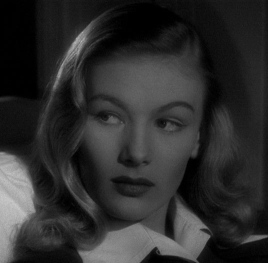I was going to watch Infernal Affairs last night but then I said “whoa, Bryant. Cut back on the noir. There’s been nothing but for a while; maybe it’s time for a break?” In service of purging the noir obsession from my system, let’s get the last two movies I saw at the Brattle L.A. Noir series into one post, shall we? It’s especially convenient since they were a double bill. Sounds like a plan.
First, Criss Cross. It’s a quintessentially noir story about a big lug who’s in love with the wrong woman; he left her, and when he comes back, she’s involved with a local gangster. Nobody in a noir ever says “Well, we screwed up, and we have to live with the consequences.” These two are no exception, and before you know it the only way out is to screw up even further.

Burt Lancaster is a big dope in the lead role. That’s not really a criticism — he’s fine in the part, which isn’t too demanding. He’s got to be in love, and he’s got to be dumb enough to be duped. Yvonne De Carlo is a great femme fatal, pretty and sultry and just a little tawdry. In my book, the really good performances were Dan Duryea as the gangster and Stephen McNally as the detective trying to help his pal. (His great line: “I should have been a better friend. I shoulda stopped you. I shoulda grabbed you by the neck, I shoulda kicked your teeth in. I’m sorry, Steve.”)
What else? Structurally sound, satisfying, a really great set piece for the end of the movie which appears to be located at the end of the world. It was remade by Stephen Soderbergh as Underneath; I’m betting that’s one of the reasons it was chosen for this series. With this alongside Point Blank, you begin to see the outlines of the ways in which these noirs influenced Soderbergh.
The other reason’s got to be the astoundingly surreal robbery scene: it takes place in a cloud of poisonous gas, with all the gangsters wearing gas masks, and I almost gasped when I saw what was happening. Lancaster is without a mask, and the gangsters come looming out of the fog with this inhuman masks on their faces and guns in their hand, and the paranoid tension just hits a whole new level. It’s man facing an alien world of the future. (C.f. Point Blank again.) Awesome, awesome scene.
And then I saw This Gun For Hire. Skipping to the end for a second: gas masks play a pivotal role. Heh. And Yvonne De Carlo has a bit part. So Criss Cross was the perfect prelude, even though it’s not an exceptional movie.
That is not the case for This Gun For Hire, which left me with a warm little glow in my tummy. Yeah, it’s a grim story of a lone assassin who was abused by his aunt, but so what? It’s a great understated tale and those make me happy. It’s also the seminal grim story of a lone assassin: John Woo lifted the theme by way of Le Samourai for The Killer, Jean Reno’s Leon owes his style to Alan Ladd’s Philip Raven, and I could go on for quite a while.

So what’s so great about This Gun For Hire? Besides Alan Ladd, it’s also got Veronica Lake, who kindly defines winsome for us. She’s not really the type to wind up with her cop fiancee — she’s a nightclub performer who instinctively wants to help the stone cold killer. But hey, it’s a Code movie, what are you going to do?
Mostly, though, it’s got Alan Ladd. Touch on Point Blank again: This Gun For Hire is also about a criminal going down from San Francisco to Los Angeles for revenge. Alan Ladd’s as stony as Lee Marvin (except for one misconceived scene where he breaks down in front of Veronica Lake), but it’s a cooler, more cerebral calm. He knows he’s been done wrong, and he’s getting revenge not for the sake of revenge but for the sake of business. Unlike Lee Marvin, he gets what he wants at the end. Like Lee Marvin, he pays a price.
And despite it being a Code movie, Alan Ladd has a distinct edge. There’s a moment quite early on when I said “He’s not going to shoot that woman — ah, see, his gun misfired! It’s an out!” I was quite wrong. There’s no effort to paint him as evil: he’s just a man who happens to kill for a living. No compunctions.
Somewhere between Graham Greene’s novel and the screen, a fairly noticeable dose of patriotism crept into the movie. I wound up deciding that Ladd wasn’t motivated by the patriotic appeals, though, even if Veronica Lake was. The key was the woman and the desire to do good — not for his country, but for her. To think of him as a hitman who decides to fight for America weakens the movie by abstracting his decision.
So there you go. A whole lot of noir this week. Maybe I’ll divert myself with some classic comedies next; nice change of pace, you know?

